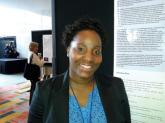PHILADELPHIA – Despite an overall agreement on its merit, both parents and their adolescent daughters are leery of the confidential interview in the gynecologic setting, in part because each cohort believes that it is tantamount to parents being excluded in the teen’s health care decision-making process.
"The majority of parents felt that this was inappropriate for their teen because this was a specialized setting," Dr. Gylynthia E. Trotman, a second-year fellow at Medstar Washington Hospital Center, Children’s National Medical Center, said in an interview.
"The adolescent felt that way, too, which came as a shock to us," Dr. Trotman said during the poster session at the annual meeting of the North American Society for Pediatric and Adolescent Gynecology. "They wanted parents to be a part of their decision making."
The data, derived from a survey of 62 pairs of parents and 62 of their collective adolescent daughters between the ages of 11 and 17 years, showed that while 85% of teens and 78% of parents thought the confidential interview was beneficial, 31% and 40% respectively thought it limited the parents’ role in addressing their child’s health concern. In addition, only half of parents surveyed fully knew and understood the confidentiality policy at their daughter’s clinic.
Only half the parents in the study understood that they would only be informed of the details of the interview if their child assented, or if their child was at serious risk. A third thought they would be informed of what their child revealed, regardless of what the teen wanted. Nearly 20% said they were unsure of the clinic’s policy on confidentiality.
The findings led Dr. Trotman and her colleagues to conclude that gynecologic specialists could do more to educate patients and their families about the confidential interview and improve the efficacy of its delivery.
Meanwhile, despite a third of parents stating that the most appropriate age for confidential interviews to begin was age 17 years, the study also found that the adolescents were engaging in an array of risky behaviors, including but not limited to those to do with sex, as early as age 11 years.
There was parity between what the parents perceived were their daughters’ sexual activity and the percentage of teens who reported being sexually active (12% vs. 15%); however, Dr. Trotman said that while "parents are definitely speaking to their teens more about sex and about drinking alcohol," they were essentially unaware of the extent to which their children were reportedly bullied and/or engaging in self-harm, eating disorders, and other deleterious behaviors.
"At all ages, there was a significant difference between the parents’ perception of their own teen’s [behavior] and what behavior the adolescents [reported]," said Dr. Trotman (P less than or equal to .0001).
"This is the message we try to get across: that the confidential interview is for more than talking about sexual behaviors," said Dr. Trotman.
Dr. Trotman reported no relevant disclosures.
wmcknight@frontlinemedcom.com
On Twitter @whitneymcknight
